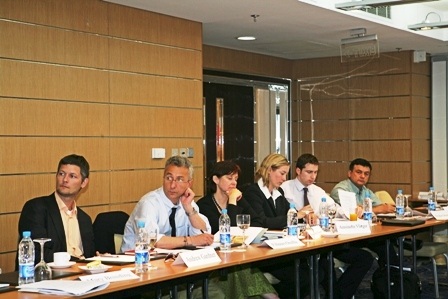Focused Discussions, Race & Society, Regional Studies
Migrant Labor in the Gulf Working Group I

On May 16–17, 2009, CIRS convened the first of its working group meetings with its research grant program dedicated to the study of migrant labor issues in the states of the Gulf Cooperation Council. The working group was comprised of twenty international and local participants from a variety of disciplines, including anthropology, political science, sociology, and public policy. Participants also included policy specialists and migrant labor rights activists. The four research grant awardees that CIRS selected as part of its research grant program also took part in shaping the direction of the initiative.
Beginning in 2008, CIRS launched a major research initiative on migrant labor issues and concerns in the Gulf region. The initiative has two distinct but interrelated streams.
One stream consists of awarding Research Grants to scholars interested in conducting primary research and fieldwork on migrant labor issues in one of the states of the Gulf Cooperation Council.
The second stream, which runs simultaneously alongside the Research Grants program and also includes some of the Grant recipients, consists of a Migrant Labor Working Group of experts in the field. The Working Group consists of academics, experts, labor organizations, and representatives from various governmental and non-governmental organizations. The recipients of the Research Grants are active in the Working Group.
The Migrant Labor in the Gulf research initiative is especially significant in the current global financial climate, and also given its size and significance in relation to the GCC economies. CIRS has undertaken this research initiative in order to fill the vacuum in the scholarship on the conditions, composition, and overall significance of migrant labor throughout the Gulf region. To this effect, the CIRS research grants program is designed to sponsor the research of four long-term and in-depth projects on different aspects of migrant labor in the GCC. This is the first fully-funded, academically-sponsored research of its kind to take place in the region.
The working group meeting was divided into four different research agendas. The first day of the meeting was dedicated to debating the issue from anthropological and sociological perspectives, and the second day concentrated on the practical aspects of labor migration and issues related to public policy. Participants were invited to identify those principal areas of research related to migrant labor in the Gulf were additional research could be generated and future research inquiries should be directed.
Five central themes and areas of scholarly attention were identified as a result of the two-day study. They include: the difficulty of data-collection and analysis and the added problem of data validity and accuracy; the need to problematize and critically assess the casual use of particular terminologies; the need to address issues of belonging and fitting into the cultural paradigms of the host country; the need to place migrant labor in the Gulf within broader international scholarship and comparative trends; the need to examine the state as an instrument of power and its relationship with ensuing laws.
Further issues that needed to be addressed included the paucity of research concerning gender within migrant labor studies, as well as an examination of the various economic categories of what is termed “migrant labor.” Studying the issue of migrant labor has far-reaching implications, both on the level of the individual and on the level of local and global economies.
The CIRS research initiative on migrant labor is designed to last for approximately two years, at the end of which CIRS will publish its findings in a comprehensive study of the subject in an edited volume titled, Migrant Labour in the Gulf (Columbia University Press/Hurst, 2012).
-
Read more about this research initiative
Participants and Discussants include:
Attiya Ahmad, Duke UniversitySadoun Alhayali, Qatar Foundation for Combating trafficking in HumansSabika Al Najjar, Bahrain Human Rights SocietyAmna Al Sulaity, Qatar National Human Rights CommitteeZahra Babar, CIRS, Georgetown University School of Foreign Service in QatarMary Breeding, ISIM/Georgetown UniversitySuleman Din, American University of CairoBridget Ganguly, Al Amana Center, OmanAndrew Gardner, Qatar UniversityDirgha Ghimire, University of MichiganHend Abdalrahman Mohamed Jolo, Qatar UniversityMehran Kamrava, CIRS, Georgetown University School of Foreign Service in QatarHabibul Khondker, Zayed UniversityNoora Lori, Johns Hopkins UniversityDavid Mednicoff, University of Massachusetts/ AmherstSuzi Mirgani, CIRS, Georgetown University School of Foreign Service in QatarSharon Nagy, DePaul UniversityFilippo Osella, University of SussexMizanur Rahman, National University of SingaporeNasra Shah, Kuwait UniversityHélène Thiollet, CERI/Independent ResearcherAntoinette Vlieger, University of Amsterdam
Article by Suzi Mirgani, CIRS Publications Coordinator